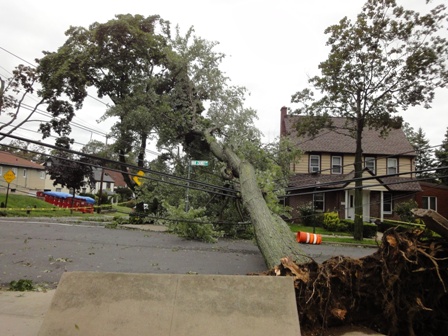Those extended periods without power need to be over, according to Councilmember Elizabeth Crowley, who introduced legislation shortly after the storm that proposes installing underground power lines in her district.
“The benefit of moving these wires underground outweighs financial cost. Con Edison has a responsibility to make sure that residents in Queens are afforded the most technologically advanced and efficient power supply that other customers with underground wires are accustomed to,” Crowley said in a statement.
According to the councilmember, the 30th district has miles of above ground distribution wires that make it experience frequent outages. The utility company that services the area, Con Edison, contends that installing underground power lines would be an unnecessary and costly upgrade for those neighborhoods.
To institute underground power lines, the utility company would have to foot the entire bill, which would total almost $1 million a mile and cost each homeowner in the area up to $10,000, said Chris Olert, a spokesperson from Con Edison.
“You have to tear up sidewalks, streets, pavements – it’s terribly expensive,” he said.
Underground power lines would increase electricity reliability in the area. Nearby Manhattan has underground wires and experiences fewer outages than Queens, according to James Denn, a spokesperson for the New York State Public Service Commission.
Though the underground lines are more reliable, they could also be more difficult to get to and expensive to repair than overhead power lines, Denn said.
While the advantages of having underground power lines in communities is clear, the issue boils down to whether or not the costs outweigh the benefits.
“The bottom line to this discussion is cost versus the gain in reliability,” he said.
Crowley is in discussions with Con Edison to come to a compromise on who should be responsible for the bill. The councilmember is also looking at the option of subsidizing the costs with City Council dollars, according to Crowley spokesperson, Kaitlin Moore.
If the community were to decide it wanted to switch to underground lines, not only would their electricity rates go up to pay for it, but the bills of their neighbors would go up too. Those residents wouldn’t be able to have the benefit of underground lines, but would see increases in their monthly bills, Denn said.
One cheaper solution to the issue is better tree maintenance. If Con Edison were to routinely prune trees in the neighborhoods, it could prevent them from falling onto overhead power lines during bad storms.
“The simplest approach is to have an aggressive vegetation management program,” Denn said. “That’s the most cost effective approach.”
Pols push for underground power lines
































